XCOM. Get used to that word if you're not familiar with it, as it's going to come up a fair bit in this review. A classic alien-fighting turn-based strategy game series that first made shockwaves on the PC with UFO: Enemy Unknown in 1994, and later inspired the critically acclaimed 2012 PC/console remake XCOM: Enemy Unknown, it was a game that featured tense and methodical combat, permadeath, careful base management and crushing difficulty, as you struggle to fend off a hostile invading alien force. Struggling at first as their technology far outpaces your own, you eventually start to turn the tide of war through reverse-engineering their own weapons, and using their tech against them. In short, it's one of the most challenging and rewarding games in the strategy genre, and an absolute classic.
XCOM is basically the game that Falling Skies is modelled on... or, perhaps more accurately, it's the game that Falling Skies desperately wants itself to be. Despite being functional enough, Falling Skies tries to ape the crown king of the genre - but it doesn't do anything quite as well. Although it's an admirable attempt at an XCOM clone, with a decent level of accessibility for those new to the turn-based genre, Falling Skies' overall lack of originality and questionable design choices will leave you unsatisfied - especially if you're an XCOM veteran.
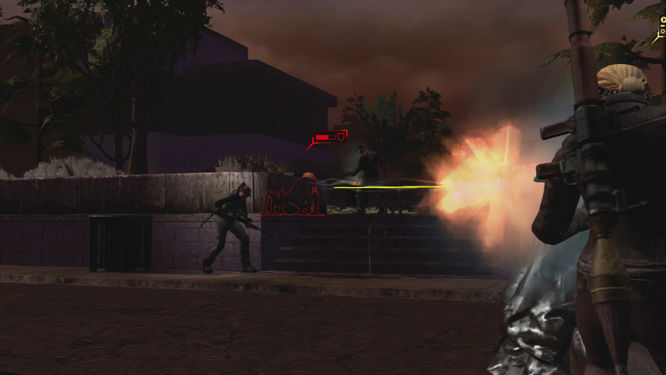
Because... aliens
In a similar manner to another recent game that features guns, shooting and hostile invading alien forces (cough, cough *Destiny* cough), Falling Skies kicks off with a rather hefty exposition dump when you start a new game. Eponymously titled after the sci-fi TV series of the same name, you take control of a team of rag-tag human survivors who must fight back against an evil race of aliens known as the 'Espheni'. These guys have invaded Earth, defeated our forces and have now effectively got full control of the planet. Not good.
While this ungainly info-dump of narrative at the start of the game is enough to give you an awareness of the TV show's style and themes, it's a pretty unsatisfying starting point for someone who's completely new to the franchise - like us. Thankfully, all you really need to know is this - it's your job to guide these human survivors through the game's missions as the base commander, having your troops kill aliens, collect resources and fight back as part of the human resistance.
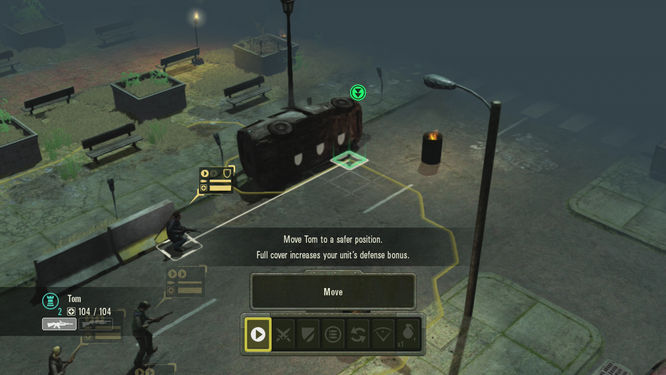
Check and mate
The gameplay and combat in Falling Skies takes the form of a turn-based strategy cover shooter - kind of like chess, only with hostile alien forces as your cunning multi-eyed opponents. You have a set number of moves to make each turn, which you can use to position your troops, get them into cover, have them fire on enemies, hunker down defensively or move further into the map. Once your turn is over, then the alien Aspheni race get to strike back, and so on and so forth. Missions usually require you to recover valuable supplies vital to the human resistance, destroy alien communication devices and systems, and, of course, kill plenty of the spidery alien fiends along the way.
The catch is that your viewpoint into the level is fairly limited, as you can only see a small distance beyond your troops. The rest of the map is covered in the famed, dark fog 'o war - so there's a need to be cautious, using the environment as cover, as enemy aliens can be lurking just out of sight in the darkness, waiting to attack. Leave your troops too exposed, or allow them to get flanked, and you can quickly find yourself in a world of pain - pain which soon leads to permadeath. Much like in real life, unfortunately, this means that once a soldier's dead, they're gone for good. Caution, patience and a careful awareness of your surroundings, troop placement and equipment are all vital to your success.
For newcomers, there's a good combat tutorial right from the off, guiding you gently through the opening level/tutorial mission. It's easy to pick up for a beginner, and it teaches more experienced players that it's an XCOM clone - so if you've played that, you'll probably know what you're doing here. Having said that, the tutorial does skimp on some small but important points that could confuse a new player. Weirdly, things like damage-over-time combat effects, such as bleeding (bleeding wounds need to be bandaged, otherwise your character slowly but continuously leaks claret and dies) aren't actually touched on in the tutorial. It wasn't a major problem - the frequent damage indicators popping up every turn let an experienced strategy gamer clock what's happening - but it's the sort of small detail that could prove confusing if you aren't familiar with turn based strategy conventions.
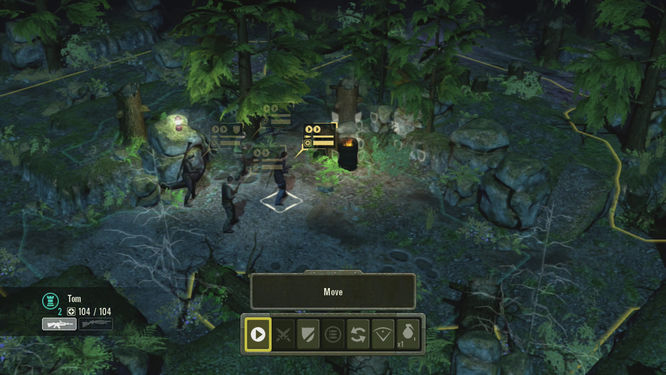
Copy-cat
Speaking of those conventions, it probably bears repeating that those who've played XCOM will be in familiar territory here, as the game is an XCOM clone in pretty much every way. It's so similar, it even uses the same in-game cover indicators, movement boundary colours, combat animations, and in-game close-ups as XCOM: Enemy Unknown. Having said that, despite the wholesale copying of XCOM's design, for a TV-licenced game, this is pretty good stuff. Unlike some of the dire movie to game cash-ins that have been spewed out over the years, Falling Skies is a solid and functional game. Making this a turn-based style game rather than going the tired and typical third person shooter route that tie-in games tend to opt for was the right choice, and the perfect vehicle for the series' depiction of a desperate human struggle against superior extra-terrestrials.
The only problem is, while a lot of things are pretty much identical to Firaxis' game, there's nothing particularly original brought to the table either - and the few deviations from XCOM that Falling Skies makes tend to be the source of it's most significant problems.
For example, a significant number of the enemies you're fighting are melee based - which seems a bit of an odd design choice for a game that's supposed to be about tactical turn-based cover shooting. Additionally, when you're fighting the alien-possessed human enemies (who can shoot at you), moving into said cover is often a lot more trouble than it needs to be. Floor textures sometimes block grid icons, making it very hard to see where exactly your cursor is on the map, and it's also incredibly easy to accidentally place troops out in the open far too frequently.
When you actually can see the cursor, it's a fiddly thing to control. Both the left and right analogue sticks control the cursor - the left stick is for general navigation, whilst the right stick offers slightly more fine-tuned grid-to-grid movement, but it feels a bit unnecessary. Greater camera control on the right stick (just like in, you guessed it, XCOM) would have been far more useful an option to have, as just looking around the levels can feel like a particularly clunky task. As it stands, the camera can only be controlled using the left and right bumpers, which snaps your view around in an awkward 90-degree jerk. Placing your troops accurately requires a great deal more guess work and working round the lunging camera controls than it should.
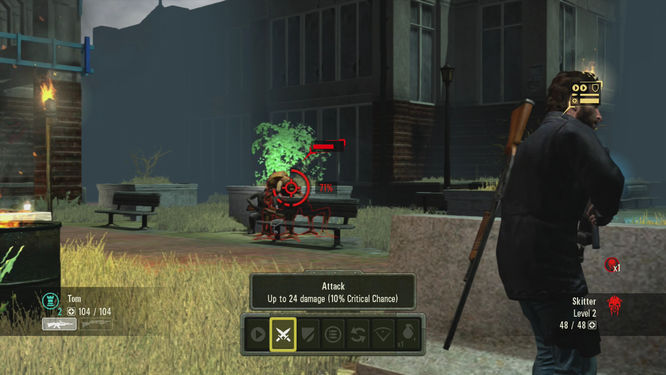
(Un)balancing Act
The combat system, and in particular the way that the soldier classes work together can also feel a bit problematic at times. With the exception of the snipers, the different classes can feel largely indistinguishable from each other, with the only real difference between your troops being their annoying dialogue barks, and not their combat specialisations. A particularly boisterous soldier early on would regularly yell "ENROU-TAY!" whenever ordered to a new spot. On the plus side, at least it gave us handy experience in removing soldiers from our squad.
More importantly, the balancing of the different classes can feel a bit off. For example, snipers are allowed to carry shotguns as an alternative to their pistol, which essentially makes them overpowered. As the rest of the classes are pretty indistinguishable from each other, you'll find that you can easily do without certain ones, and you'll overuse others. My teams were usually populated with at least a few of these shotty-sniper hybrids, allowing me to deal with the majority of encounters from multiple ranges with relative ease.
There's also some strange moments where your soldiers can exhibit rather glitchy behaviour too. On one memorable occasion, my best sniper (Snipey McGoodshot, to give you her full name) was struck momentarily blind, and apparently couldn't see the enemy marksman hiding in a burnt out school bus, right in front of her on the map. Needless to say, hiding or not, they should have been easy to spot with a long-range specialist. However, my Berserker/Heavy solider (I CAN HAZ BIG GUNZ) who was lurking in the distance, and is usually lucky if she can see past the end of her nose, yet alone hit anything more than a few feet away, quickly spotted the enemy, and proceeded to take them down with some surprisingly accurate shots with her beefy machine gun. Confusing, huh?
Overall though, despite a few hiccups here and there, the gameplay in the missions is solid; it's a little rough around the edges and baffling at times, but it's still enjoyable. However, it's upon returning to your base post-mission success that the game really stumbles.
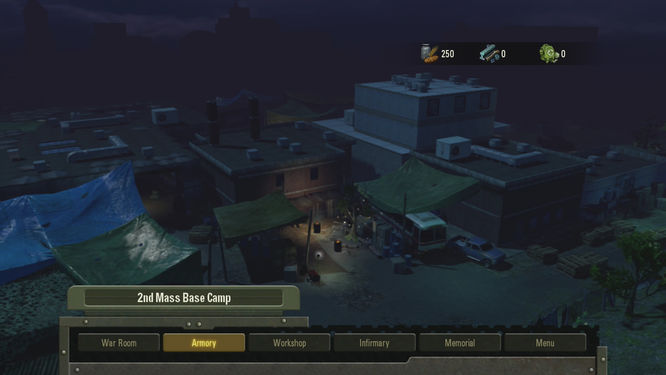
All your base are... well, pretty basic
For a start, there's no base tutorial. You're totally left on your own after the first tutorial mission, and dropped in thoroughly at the deep end in the base side of things, which could be enough to put beginners off - until you realise the base sections don't actually do all that much. Unlike XCOM, there's no alien UFOs to worry about in the sky, no Interceptors you've got to desperately repair and equip in time for the next attack, no base invasions - you've got nothing much to worry about. Which is a problem. The base is essentially just a glorified mission select menu.
In fact, this is one of the game's biggest disappointment - the lack of any meaningful base resource management system. In the XCOM games, a large part of their winning formula is that alongside calling the moment-to-moment shots in your high-risk clashes with the alien ground forces, you've also got to focus on the day-to-day operations and general management of your bases as well. Carefully managing your limited resources in this meta-game was of great importance; ordering in new weapons and equipment, hiring new staff, starting research projects and constructing new workshops and laboratories for your base were tasks crucial to your success. At times, juggling all these could be as delightfully stressful and painfully agonising as your combat operations; you had to be both a quick-thinking tactician in the heat of combat, yet also a calm and collected long-term organiser to succeed.
Falling Skies does away with all but the most basic of these base management functions, which is pretty disappointing. Your choices are mainly limited to buying upgrades to expand the size of your team, or to buy bigger and better guns for your soldiers. Whilst this does make things easier for a new player, it effectively lobotomises the player's resource management abilities. Being able to control the minutia of your base's operations and carefully manage a limited pool of resources is one of the best parts of a good strategy game, and it's a shame that it's received such a surface-level treatment here.
That's the central problem with Falling Skies, then - there's no real consequence to any of your choices, little responsibility in managing your operations and there's no sense of urgency, no feeling of imminent failure or impending doom breathing down your neck. This is particularly apparent when you send soldiers on optional solo resource-gathering dispatch missions - you can send fresh-faced recruits, who have absolutely no combat experience, out on a 'dangerous' mission with zero risk of them being killed off.
There's little risk and therefore not much reward either. It absolutely saps the game of the vast majority of its challenge or satisfaction. With no significant threat of failure or randomisation to the missions and gameplay, the experience quickly feels rather lacking and weak. Yes, losing your troops in mission can be disastrous, but your performance in one mission doesn't massively affect your overall progress, and if things are really going down the drain, you can just abort missions that aren't going well with no penalty at all. Your choices, actions and progress within the Falling Skies feel unimportant and meaningless as a result.
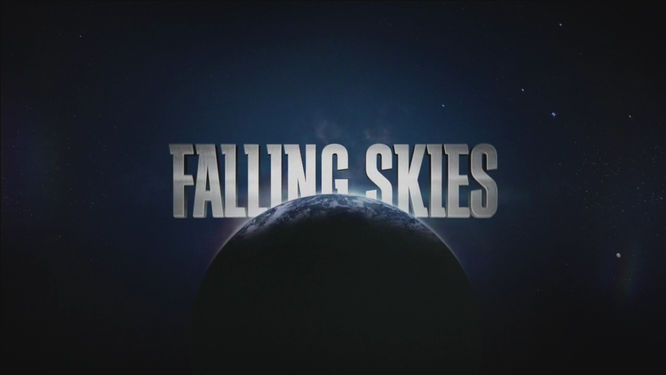
Weird, looks more like it's rising there.
If you're a big fan of the Falling Skies TV show, and you're also looking for a 'lite' turn-based strategy game to find your feet with the genre, then this is certainly a decent place to start. Falling Skies' combat, though fiddly at times, is pretty solid, and you'll get to experience tactical turn-based gameplay at a basic, albeit unchallenging pace.
In it's own right, it's probably one of the most complex TV tie-ins out there. Ultimately in context though, it's a poor man's XCOM - if you're after a rewarding challenge, with meaningful and tough choices, dynamic events, intense combat and intricate base management, all wrapped up in a friendly and accessible user interface, then I'd recommend picking up a copy of XCOM: Enemy Unknown/Within instead. Trust me, you won't be disappointed. In the meantime, if you'd kindly take me to your leader... please?
Format Reviewed: Xbox 360




















